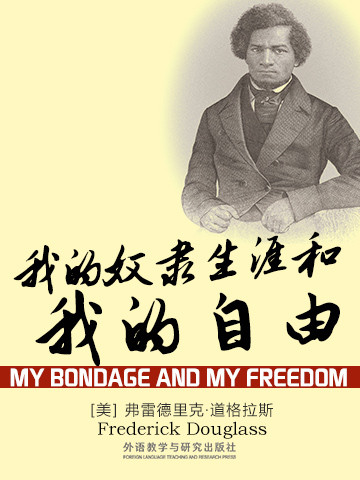In his foreword to the 2003 Modern Library paperback edition, John Stauffer writes: "My Bondage and My Freedom," [is] a deep meditation on the meaning of slavery, race, and freedom, and on the power of faith and literacy, as well as a portrait of an individual and a nation a few years before the Civil War. As his narrative unfolds, Frederick Douglass—abolitionist, journalist, orator, and one of the most powerful voices to emerge from the American civil rights movement—transforms himself from slave to fugitive to reformer, leaving behind a legacy of social, intellectual, and political thought. The 1855 text includes Douglass's original Appendix, composed of excerpts from the author's speeches as well as a letter he wrote to his former master.
《我的奴隶生涯和我的自由》是弗雷德里克·道格拉斯发表于1855年的一部奴隶自传作品,是道格拉斯三部自传中的第二部,第一部作品《弗雷德里克·道格拉斯:一个美国奴隶的叙述》的延续发展。作品讲述了作者由奴隶走向自由的故事。道格拉斯被解放后,就成为废奴运动中一名杰出的领导者,演说家和作者。
My Bondage and My Freedom is an autobiographical slave narrative written by Frederick Douglass and published in 1855. It is the second of three autobiographies written by Douglass, and is mainly an expansion of his first (Narrative of the Life of Frederick Douglass), discussing in greater detail his transition from bondage to liberty. Following his liberation, Douglass, a former slave, went on to become a prominent abolitionist, speaker, author, and publisher.
- My Bondage and My Freedom
- INTRODUCTION
- APPENDIX Containing Extracts from Speeches, etc.
- CHAPTER I Childhood
- CHAPTER II Removed from My First Home
- CHAPTER III Parentage
- CHAPTER IV A General Survey of the Slave Plantation
- CHAPTER V Gradual Initiation to the Mysteries of Slavery
- CHAPTER VI Treatment of Slaves on Lloyd's Plantation
- CHAPTER VII Life in the Great House
- CHAPTER VIII A Chapter of Horrors
- CHAPTER IX Personal Treatment
- CHAPTER X Life in Baltimore
- CHAPTER XI "A Change Came O'er the Spirit of My Dream"
- CHAPTER XII Religious Nature Awakened
- CHAPTER XIII The Vicissitudes of Slave Life
- CHAPTER XIV Experience in St. Michael's
- CHAPTER XV Covey, the Negro Breaker
- CHAPTER XVI Another Pressure of the Tyrant's Vice
- CHAPTER XVII The Last Flogging
- CHAPTER XVIII New Relations and Duties
- CHAPTER XIX The Run-Away Plot
- CHAPTER XX Apprenticeship Life
- CHAPTER XXI My Escape from Slavery
- CHAPTER XXII Liberty Attained
- CHAPTER XXIII Introduced to the Abolitionists
- CHAPTER XXIV Twenty-One Months in Great Britain
- CHAPTER XXV Various Incidents
- 书评 写书评
- 笔记
-
书评加载中...













 京公网安备 11010802032529号
京公网安备 11010802032529号
笔记加载中...